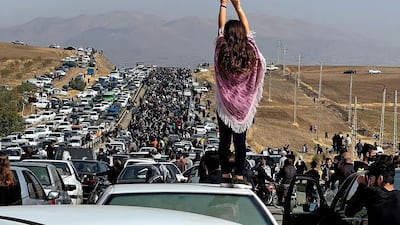Iran’s raging anti-regime protests may be regarded as the "revolution of the new generation", but millennials and baby boomers are also playing a keen role.
Protests began in September after Mahsa Amini, 22, an Iranian-Kurdish woman arrested for not wearing her hijab properly, died in the custody of the country's morality police.
Her family claimed Mahsa was beaten and struck on the head several times, but the authorities denied the allegations, claiming she died due to an "underlying illness".
The protests were not the first time women have resisted the veil. Mahnaz, 36, an architect living in Karaj, removed hers four years ago.
“I felt more connected to the environment," Mahnaz says by Skype. "A sense of joy, being alive. And you think to yourself, 'Could life have been like this all along?'
“The hijab made me a stranger to myself, cut off from the environment. Yet there was a price to pay."
There was a mixed reaction from the people on the street. Some were surprised, some supportive, but on several occasions she was beaten by a paramilitary volunteer group called the Basij forces, hardline regime supporters.
The recent protests are not without precedent. In December 2017, Vida Movahed removed her scarf and stood on a platform in the artsy Enghelab (Revolution) Street in Tehran to protest against the mandatory hijab law.
Her protest led to sentence of a year in prison, but she was pardoned by the supreme leader. She started a movement called The Girls of the Enghelab Street, which expanded to other cities.
These girls stood on platforms, removed their hijabs, tied them to a stick and waved them as a form of protest. Twenty-nine girls were arrested for being part of that movement.
The most recent resistance against the government also carries significant risk. Two men aged 23 have been executed for taking part so far. Hundreds have been injured and hundreds more imprisoned.
"Every time I leave the house, I mentally prepare myself for the worst. Being shot. Being raped. Being executed," Mahnaz says. "As I walk out of the door, I make my peace with it.
"The protests are suppressed by two groups. One is IRGC [Islamic Revolutionary Guard Corps]-affiliated forces who wear normal civilian clothes and people call them Lebas Shakhsi (plainclothes men).
"If they arrest you, it's the worst as no one knows where they will take you and the detainees often are found with severe injuries or at points dead.
“There is another group, the police. If they detain you, you will likely be placed in a prison, where hopefully there are rules and laws in place that will make it safer than the first scenario."
She says people are also using other methods to protest, including recent strikes in the country, and some are resigning from government positions.
Protesters are a younger, more tech-savvy generation, so social media is being used more prominently than ever before to organise and raise awareness of their aims.
Mahnaz says the Iranian Cyber Police “really care about how things are reflected on social media".
She had a visit from them after posting in support of the protests.
“They said the only reason they have not arrested me is that I don’t have many followers," Mahnaz says.
A new generation?

















Protesters from earlier years are annoyed by the term "revolution of the new generation".
Negar, 42, a psychologist living in Tehran, says when she demonstrated in her youth, no one called it a young movement.
With a wry smile, she says this generation has the benefit of being supported by more open-minded parents.
Those of her age who have children have more to lose, and they fear that their children will grow up without parents.
"My sister is two years older than me and divorced," Negar says. "As much as she wants to play an active role, she is scared for her children.
"She doesn't care what happens to her but she is responsible for her kids, and if she is killed or arrested, no one can substitute for her as a mother"
She vividly recalls a mother who was begging Lebas Shakhsi agents to return her son to her.
“She was crying at their feet asking where her son was, telling them he has done nothing wrong and was just peacefully protesting," Negar says.
“I can’t get her voice out of my head.”
Bita, 60, a retired teacher living in Tehran, says she has taken an active role because she feels the weight on her shoulders of the 1979 revolution, which brought the hardline religious government to power.
She thinks she owes it to the young generation to fight for change.
"We made a mistake by blindly pursuing a major change without fully understanding the details it would entail," Bita says.
"It is my children and grandchildren who are paying the price for the actions of my generation."
She says young women, the largest sector of the protests, have been subject to sexual harassment by security forces. Some incidents have been caught on camera.
In one video, the police in uniform hit a young girl and then grope her breasts while she is on the ground.
"The violence perpetrated against people is unimaginable," Mahnaz says. "People are being tortured mentally using new techniques.
"You are called and threatened that you must cease your political activities or you will be summoned to the Ministry of Intelligence," Mahnaz says.
Nevertheless, the women feel achievements have been made. They believe more women are finding the courage to experience having the choice to wear what they want.
They say you can see significantly more women on the street without a veil, and claim this is becoming normalised.
“Another big win, maybe the biggest, is that the dark and unbreakable image of an undefeatable regime has shattered," Mahnaz says.
"Now a lot of people think it's just a matter of time for the new chapter to begin.”


